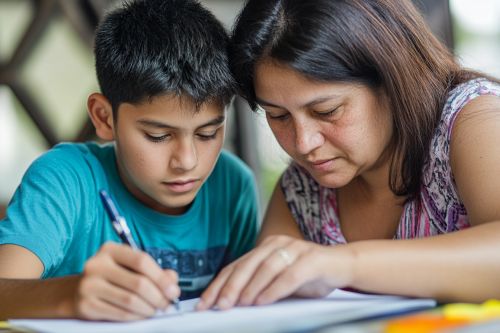

Imagine your child is starting to learn a new language. For many parents, this is a time filled with hope but also worries. Will my children manage? How can I support them?
Parental involvement is important in language learning. Your child needs more than just help with homework. He needs a supportive environment that encourages daily language use and boosts their motivation.
Spis treści:
Early language exposure
Young children’s brains are incredibly adaptable and receptive. They naturally absorb new languages with ease. Kids who are exposed to a foreign language early on develop communication skills faster. They have a better grasp of grammar, and are more likely to become fluent as adults.
How can parents support early language learning?
Even if you are not fluent in a foreign language, you can still create a positive learning environment. Start with simple, everyday activities:
Read books in a foreign language – Regularly listening to stories in another language helps kids get familiar with its sound and rhythm. Choose books with simple text and pictures.
Listening to songs and rhymes – Music is a powerful language-learning tool. Children easily remember tunes and rhythms. Learning new words through songs becomes enjoyable. Singing and clapping along turns into real fun.
Use simple phrases in conversation – Incorporate single words or phrases into everyday chats. Say “hello”, “I am sorry” and “thank you” in a foreign language. This helps your child feel more confident in the new language and removes the fear of speaking.
Activities that build language foundation
Board games, flashcards, and labels in a foreign language are excellent ways to learn through play. You can also create your own games, like “find an object in the house and say its name in Spanish”.
Select age-appropriate content in the foreign language to complement daily learning. Look for interactive programs that ask your child to answer questions and repeat words.
There are many apps online that make language learning fun. Track your child’s progress and work on tasks together.
How can parents’ positive attitude toward language learning affect their children?
Children naturally imitate the attitudes of adults. Their parents are their first and most important role models. If you approach learning English, Spanish, or French with enthusiasm, your child will also see it as something worth the effort. Treat it as an exciting adventure and see the difference.
Learning a language, like any other skill, takes time and patience. Children may feel discouraged from time to time. Sometimes, they will not see immediate results. Give them encouragement and reminders that every small achievement is a step forward.
Parents can support their child’s motivation
Frequently remind your kid that you believe in his abilities. A simple, “I know it is tough, but I can see how well you are doing!” works wonders during moments of doubt.
Focus on what your child has already accomplished, rather than what still needs to be done. Even small steps deserve recognition because they build a positive relationship with learning. “Remember when you did not know this word? Now you are using it with ease!”.
Creating an environment where your child feels comfortable making mistakes and learning from him. Mistakes are a natural part of the learning process, and you should encourage your child to keep trying without fear of criticism.



Examples of positive parental actions
Praise and rewards motivate your child when used thoughtfully. However, do not just praise the results. Acknowledge the commitment they put into learning. Saying, “You worked hard during that lesson!” highlights the importance of effort, not just the outcome.
Rewards do not have to be material. They could be simple privileges: extra time on a favourite game, a trip for ice cream, or a film night. The goal is to associate language learning with positive experiences. Be careful not to overdo it, though. You do not want your child to start learning only for the rewards.
Parents can set small goals with their children. Learning a new song in a foreign language, or understanding a short story is a great motivation. Working toward these goals together strengthens your bond and helps your child feel supported in the learning process.
How can parents get involved in their child’s early childhood education?
Staying in regular contact with the foreign language teacher helps you understand your child’s strengths and weaknesses. Attend parent-teacher meetings and consultations to get specific feedback. Use this opportunity to discuss ways to support learning at home.
Participate in school events and language activities to show your child that their education matters. Open days, language competitions, and school plays in a foreign language offer perfect opportunities to engage in your child’s school life.
Being present at these events boosts your child’s self-esteem. When he sees that you care about their achievements, he becomes more motivated to continue learning. It is also a great chance to connect with other parents and share experiences.
How can you monitor your child’s progress and respond to it?
Parents should regularly review homework results and tests. It is important to speak with your childen about their feelings toward learning. Talk about what progress they make, what challenges they face, and what they enjoy.
If you notice difficulties, respond with support, not criticism. Never push for better grades. Try to understand the problem and work with your child and his teacher to find solutions. Sometimes, extra practice is enough, while other times a tutor might be needed.
Children’s language learning: Challenges
Many parents struggle with a lack of time. It can be difficult to find a moment for anything, let alone getting involved in your child’s language learning. However, even with a busy schedule, there are ways to support their education.
Even short but regular moments spent learning with your child make a difference. You can weave language learning into daily routines: naming ingredients in a foreign language while preparing a meal together, or listening to songs on the way to school.
Not knowing the language your child is learning can be a hurdle (which is why it would be good to start attending language lessons). However, it does not mean you cannot support him. One simple approach is to engage with educational materials designed for children—books, apps, and films. You can watch movies or shows in the foreign language together, even if you do not understand everything, and talk about what you saw.



The benefits of parental involvement in language learning
Children who receive regular support and motivation from their parents tend to get better grades. They pick up new language skills more quickly. When parents engage in the learning process—helping with homework, using extra resources, and having conversations in the new language—they create an environment that fosters their child’s growth.
Active parental support does not just improve academic results; it also builds a child’s confidence. When kids know their parents believe in their abilities and appreciate every bit of progress, they become less afraid of making mistakes. This confidence directly enhances their communication skills, making them more willing to speak a foreign language, even if they are not fully fluent yet.
Knowing foreign languages opens many doors for a child later in life—both professionally and personally. Communicating in more than one language is highly valued by employers. Bilingual individuals have better job prospects, can expect higher salaries, and face less competition.
Learning languages also enriches personal life. It allows for easier travel and making friends around the world. Children who start learning languages early on are generally more open to the world.
Children learn language and adults too
Would you like to speak English fluently to support your child’s learning? Our language school offers effective English courses for teens and adults. We teach practical skills that are useful in school, work, and everyday life.
Classes are led by experienced instructors who adjust the pace and level to match your needs. We focus on active communication and learning through practice, so you will start speaking and understanding English quickly.
We offer language lessons in small groups. The language teachers will focus on your progress. With flexible hours, it is easy to fit lessons into your busy schedule. Sign up today and show your child that learning English is enjoyable.

